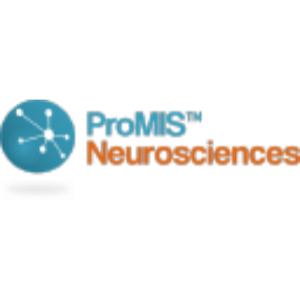ProMIS Neurosciences Publishes Study Highlighting Oligomer Selectivity and Benefit of Amyloid-Beta-Directed Antibodies
Rhea-AI Summary
ProMIS Neurosciences Inc. published a study highlighting the selectivity of PMN310 in targeting toxic soluble aggregates in neurodegenerative diseases such as Alzheimer’s disease. The study shows PMN310's differentiation from other amyloid-beta-directed antibodies and its potential to improve efficacy and reduce risk associated with plaque-binding therapies. PMN310 is currently undergoing Phase 1a clinical studies, with promising initial data expected in mid-2024.
Positive
PMN310 demonstrated a high degree of selectivity for toxic Ab oligomers, potentially improving efficacy in treating Alzheimer's disease.
PMN310 differentiated itself from other amyloid-beta-directed antibodies by avoiding binding to monomers and plaques, reducing the risk of amyloid-related imaging abnormalities.
ProMIS Neurosciences is advancing PMN310 into a Phase 1b multiple ascending dose study in Alzheimer's disease patients, showing promising potential for future development.
Negative
The variability in clinical outcomes of Aß-directed antibodies highlights the challenges in developing effective treatments for Alzheimer's disease.
While PMN310 showed promising results in preclinical studies, the Phase 1a clinical data are yet to be fully analyzed and reported, introducing uncertainty regarding its effectiveness and safety.
News Market Reaction
On the day this news was published, PMN gained 0.16%, reflecting a mild positive market reaction.
Data tracked by StockTitan Argus on the day of publication.
Study results support differentiation of PMN310 from other amyloid-beta-directed antibodies
CAMBRIDGE, Massachusetts and TORONTO, Ontario, April 30, 2024 (GLOBE NEWSWIRE) -- ProMIS Neurosciences Inc. (Nasdaq: PMN), a biotechnology company focused on the generation and development of antibody therapeutics targeting toxic misfolded proteins in neurodegenerative diseases such as Alzheimer’s disease (AD), amyotrophic lateral sclerosis (ALS) and multiple system atrophy (MSA), today announced the publication of a paper titled, “Relationship between therapeutic activity and preferential targeting of toxic soluble aggregates by amyloid-beta-directed antibodies," in the online journal, bioRxiv.
The study characterized and compared the binding profile of various amyloid-beta (Ab)-directed antibodies to monomers, soluble oligomers and insoluble Ab fibrils. The results indicate that selectivity for soluble toxic Aß oligomers may be a driver of clinical efficacy and indicated that PMN310 displayed the greatest degree of oligomer selectivity. PMN310, the Company’s novel monoclonal antibody being evaluated as a treatment for Alzheimer’s disease (AD), is currently undergoing Phase 1a clinical studies in healthy volunteers, with initial safety and pharmacokinetic data expected in mid-2024.
“The data in this publication highlight PMN310’s high degree of selectivity for toxic Ab oligomers and its differentiation from other Ab-directed antibodies,” stated Neil Warma, Chief Executive Officer of ProMIS Neurosciences. “We believe that PMN310’s ability to avoid both monomer and plaque binding has the potential to improve efficacy and reduce the risk of amyloid-related imaging abnormalities (ARIA), a key indicator of edema and microhemorrhage risk associated with plaque binding antibody therapies currently on the market and in development. We look forward to the top-line data readout for our Phase 1a study in the coming months and to advancing PMN310 into a Phase 1b multiple ascending dose study in AD patients.”
Aß-directed antibodies tested clinically for therapeutic activity against AD have shown varying degrees of efficacy. A side-by-side comparison of antibody binding to different molecular species of Aß conducted by ProMIS provided insight into the observed variability in clinical outcomes. A correlation was observed between reported clinical efficacy and the ability of an antibody to retain binding to soluble oligomers from AD brains when faced with monomer competition. PMN310 showed a high degree of resistance to monomer competition. Importantly, unlike all other antibodies tested, PMN310 also avoided binding to plaque and vascular deposits of Ab. Consequently, PMN310, may reduce the risk of brain edema (ARIA-E) and microhemorrhages (ARIA-H) often associated with plaque-binding antibodies. This premise is supported by the results showing that weekly dosing of a murine version of PMN310 at very high doses (800 mg/kg) for 26 weeks in a mouse model of AD did not cause any detectable brain hemorrhages upon microscopic examination.
The complete article can be accessed online here.
About ProMIS Neurosciences Inc.
ProMIS Neurosciences Inc. is a clinical stage biotechnology company focused on generating and developing antibody therapeutics selectively targeting toxic misfolded proteins in neurodegenerative diseases such as Alzheimer’s disease (AD), amyotrophic lateral sclerosis (ALS) and multiple system atrophy (MSA). The Company’s proprietary target discovery engine applies a thermodynamic, computational discovery platform - ProMIS™ and Collective Coordinates - to predict novel targets known as Disease Specific Epitopes on the molecular surface of misfolded proteins. Using this unique approach, the Company is developing novel antibody therapeutics for AD, ALS and MSA. ProMIS has offices in Cambridge, Massachusetts and Toronto, Ontario.
Forward-Looking Statements
This press release contains forward-looking statements that are made pursuant to the safe harbor provisions of the Private Securities Litigation Reform Act of 1995. Certain information in this news release constitutes forward-looking statements and forward-looking information (collectively, “forward-looking information”) within the meaning of applicable securities laws. In some cases, but not necessarily in all cases, forward-looking information can be identified by the use of forward-looking terminology such as “plans”, “excited to”, “targets”, “expects” or “does not expect”, “is expected”, “an opportunity exists”, “is positioned”, “estimates”, “intends”, “assumes”, “anticipates” or “does not anticipate” or “believes”, or variations of such words and phrases or state that certain actions, events or results “may”, “could”, “would”, “might”, “will” or “will be taken”, “occur” or “be achieved”. In addition, any statements that refer to expectations, projections or other characterizations of future events or circumstances contain forward-looking information. Specifically, this news release contains forward-looking information relating to the study and reported therapeutic activity and preferential targeting of toxic soluble aggregates by Aß-directed antibodies and the potential implications thereof, the Company's expectations regarding its clinical development of its lead product, PMN310, for AD, and the Company’s anticipated top-line data readout for our Phase 1a study in the first half of 2024 and plans to advance into a Phase 1b multiple ascending dose study in AD patients. Statements containing forward-looking information are not historical facts but instead represent management's current expectations, estimates and projections regarding the future of our business, future plans, strategies, projections, anticipated events and trends, the economy and other future conditions. Forward-looking information is necessarily based on a number of opinions, assumptions and estimates that, while considered reasonable by the Company as of the date of this news release, are subject to known and unknown risks, uncertainties and assumptions and other factors that may cause the actual results, level of activity, performance or achievements to be materially different from those expressed or implied by such forward-looking information, including, but not limited to, the risk that the results of nonclinical studies and early clinical trials are not necessarily predictive of future results with PMN310, the Company’s ability to fund its operations and continue as a going concern, its accumulated deficit and the expectation for continued losses and future financial results. Important factors that could cause actual results to differ materially from those indicated in the forward-looking information include, among others, the factors discussed throughout the “Risk Factors” section of the Company's most recently filed Annual Report on Form 10-K for the year ended December 31, 2023 and in its subsequent filings filed with the United States Securities and Exchange Commission. Except as required by applicable securities laws, the Company undertakes no obligation to publicly update any forward-looking information, whether written or oral, that may be made from time to time, whether as a result of new information, future developments or otherwise.
For further information:
Visit us at www.promisneurosciences.com
Please submit media inquiries to info@promisneurosciences.com.
For Investor Relations, please contact:
Stern Investor Relations
Anne Marie Fields, Managing Director
annemarie.fields@sternir.com
Tel. 212-362-1200








